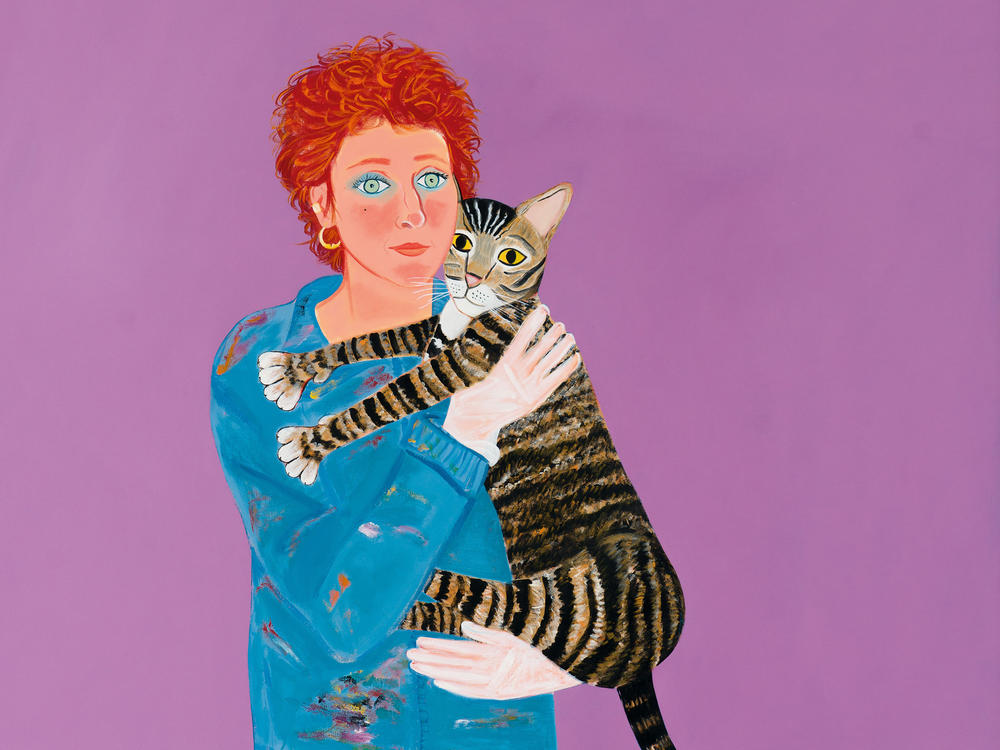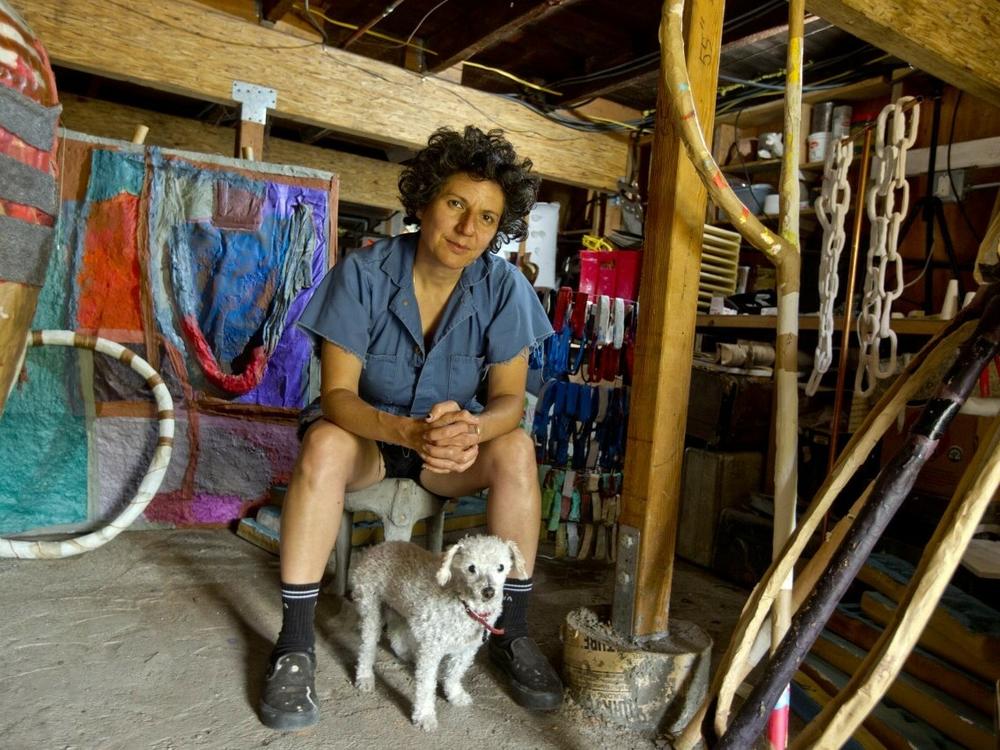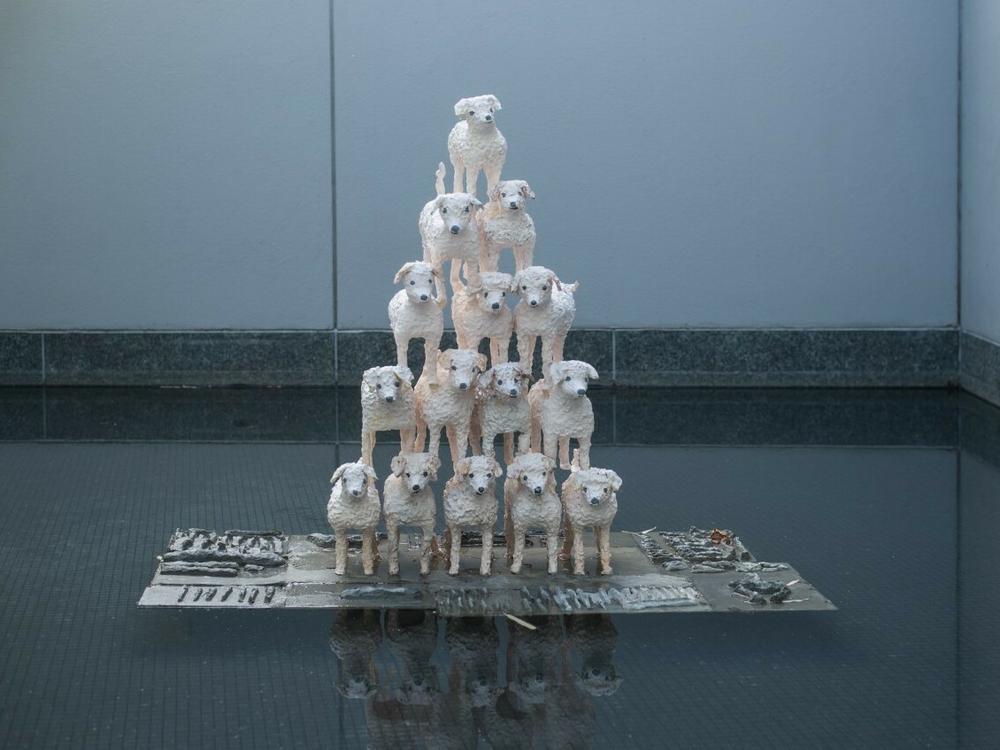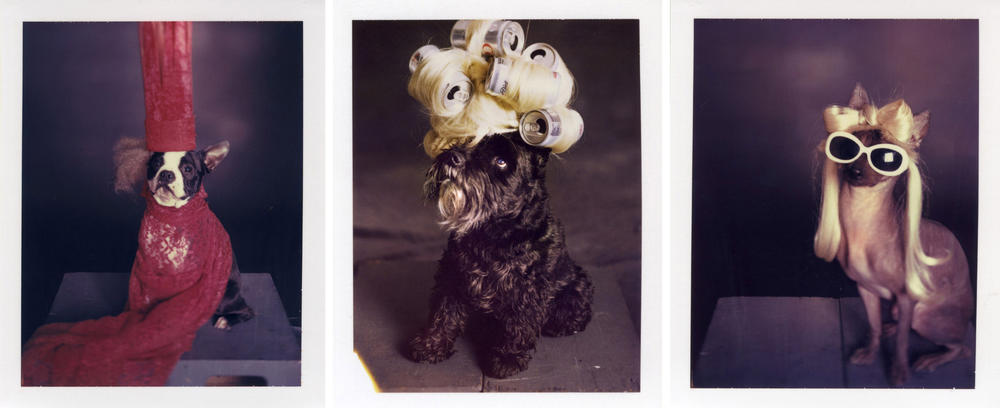Section Branding
Header Content
Mr. Whiskers is ready for his close-up: When an artist's pet is also their muse
Primary Content
At the San Francisco Museum of Modern Art (SFMOMA), there's a captivating self-portrait of the artist Joan Brown hugging Donald, her resplendent tabby cat.
"She is holding onto Donald so tightly," SFMOMA associate curator of painting and sculpture Nancy Lim said recently while touring the museum's current major retrospective of the late San Francisco artist. "It's not just an embrace. It's something more."
Every day, millions of people around the world post pictures and videos of their pets online. According to a recent OnePoll survey, one in four people in the U.S. have social media accounts for their furry friends. But the tradition of creating and sharing such images goes back about 300 years in painting and sculpture.
Brown painted dozens of pictures of her pets between the 1960s and '80s. The cats and dogs in her works seem fully-present, self-aware and all-knowing; in Joan + Donald (1982), the feline has an especially frank look in his big, yellow eyes.
"Joan considered him very wise," said Lim. "Someone who could carry on human conversation, if he could."
Donald was more than a close companion to Brown. Lim said he was also a business asset.
"She decided to list him as an income deduction, because he was a live-in model," Lim said.
The IRS audited the artist for deducting cat food and vet bills on her tax return, but Brown successfully argued her case. And Lim said her cat thereafter earned himself a nickname.
"Her friends called him 'Donald the Deductible,' " she said.
Part of an artist's daily life
Sahar Khoury said she's impressed with Joan Brown's chutzpah.
"I'm so scared of the IRS," the Oakland-based artist said. "I won't even claim my gas."
Khoury toured the Joan Brown exhibition with her service animal Esther, an adorable, curly-haired, floppy-eared, white mutt.
"She's currently around 14 and travels with me everywhere I go," Khoury said. "She unwillingly has become a part of my work."
Over the years, Khoury has crafted many sculptures featuring her pets, including a fantastical, circus-style pyramid of 15 glazed ceramic Esthers perching on each others' backs. Khoury said that just like Joan Brown, her pets — she also has a cat/artist's model named Lola — are part of her everyday landscape.
"You're just archiving your daily life," Khoury said. "And I can't imagine not having the animals be a part of that."
A modern Western tradition
The history of artists drawing inspiration from non-human animals goes back to the beginning of the history of art.
"But making portraits of pets really is a more modern phenomenon and largely in the Western world," said Alan Braddock, a professor at the College of William and Mary in Virginia who studies depictions of animals in art.
Braddock said the tradition is rooted in Western philosophical notions of human individualism — which lead to the the idea that pets are fully-realized beings rather than just "dumb animals."
One of the earliest examples is the British satirical artist William Hogarth's 1745 self-portrait titled The Painter and his Pug. In the somber-toned painting, the artists poses formally in the background, while the pug — named Trump — stands up front with his tongue sticking out at the viewer.
"Hogarth loved his dog, and saw the dog as a kind of emblem of his own pugnaciousness as an artist," Braddock said.
Other artists followed suit. Pablo Picasso made studies of Lump, an adored dachshund; Frida Kahlo's catalogue is packed with self-portraits featuring her pet monkeys and parrots.
"She admired animals' creativity and saw it as a reflection of her own," Braddock said of the famed 20th century Mexican artist.
Artists who portray other people's pets
Some artists who paint other people's pets feel this same sense of affinity.
Jesse Freidin worked as a professional dog photographer for 15 years, and is perhaps best known for a series of portraits he made in 2010 of assorted canines dressed up as Lady Gaga — The Doggie Gaga Project.
"I wasn't just photographing dogs," Freidin said. "I was photographing relationships and studying people."
Freidin said the art he makes with dogs aims to get at something deeper than cuteness, though the Doggie Gagas are admittedly very cute.
"I don't want to put myself in front of the camera," Freidin said. "But I do want to articulate something about my human condition and experience. An animal becomes this exterior representation. And it's powerful."
Joan Brown runs at the San Francisco Museum of Modern Art through March 12, 2023. It then goes on to the Carnegie Museum of Art, Pittsburgh, Pa. (May 27–Sep. 24, 2023) and the Orange County Museum of Art, Costa Mesa, Calif. (Feb. 7–May 1, 2024).
Audio and digital stories edited by Jennifer Vanasco. Audio produced by Isabella Gomez-Sarmiento. Digital produced by Beth Novey.
Copyright 2023 NPR. To see more, visit https://www.npr.org.





